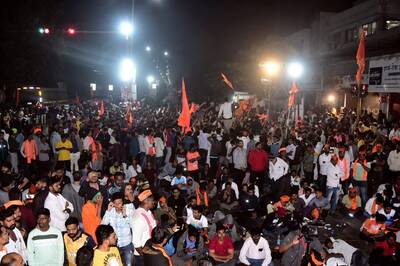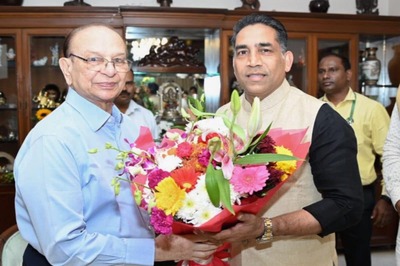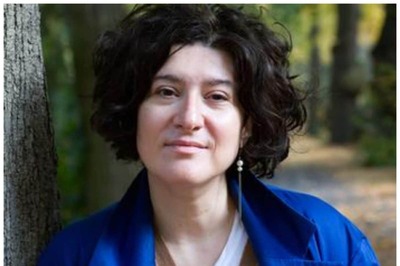
views
Prime Minister Narendra Modi’s presence at a mosque in Indore is significant on several counts catering to both domestic and international politics. Coming at a time when Madhya Pradesh, Rajasthan, Telangana, Chhattisgarh and Mizroram Assembly polls are barely 75 days away and countdown for 2019 Lok Sabha elections has begun, Modi’s reverence towards Syedna Mufaddal Saifuddin, his attentiveness towards religious hymns and acceptance of a shawl has a powerful political signal.
The General Elections next year are set to be fought largely on Modi’s larger-than-life personality, policy initiatives, robust economy, improved law and order, sanitation, administrative reforms, women empowerment, including the move to abolish instant triple talaq and Nikah-e-Halala, small loans, housing for the poor, Ujwala Yojna etc. In short, huge expectations based on these factors.
The broad signal from Indore is not so much about courting Muslim voters but about attracting majority community voters and the message that inclusiveness is integral part of Modi’s vision. A section of Muslim leadership may go on nit-picking, pointing at rather minuscule Dawoodi Bohra population of 2.5 lakh living in Indore, Bhopal, Ujjain and Burhanpur districts of Madhya Pradesh, incidents of mob-lynching, cow vigilantism, hate crimes etc. But the prime minister intends to sell a story of how he tried to reach out to every segment of the society; how more than 2.52 crore minority students, half of them girls, availed three scholarship schemes being offered by the government, and how the percentage of Muslims getting into civil services and other competitive examinations went up.
Modi was in Indore’s picturesque Saifee mosque to attend Ashara Mubarak, the commemoration of the martyrdom of Prophet Mohammad’s grandson Imam Husain in the battle of Karbala. The martyrdom of Imam Hussain is a painful but significant event in the history of Islam. Hussain was disturbed with the dynastic approach to the Islamic caliphate when Yazeed ibn Mu’awiah was appointed as Caliph. Hussain refused to accept Yazeed’s leadership and coercive methods, and instead chose to sacrifice his life to uphold democratic principles and values.
When Modi was seeking blessings from Syedna, 53rd and current Da'i al Mutlaq or supreme spiritual leader of the Dawoodi Bohra community, Madhya Pradesh Chief Minister Shivraj Singh Chouhan was watching the proceedings from closer quarters. It was perhaps Chouhan’s idea to invite Modi at Syenda’s congregation.
As Chief Minister for 13 years now, Chouhan is seen as accommodating towards minorities. Each time there was protest over introduction of Gita in school syllabus, Surya Namaskar, Bhojan Mantra, singing of Vande Mataram, the chief minister exempted Muslim students and government employees from participating.
The Chouhan regime has passed the Madhya Pradesh Freedom of Religion (Amendment) Bill, 2013, which seeks to make prior permission compulsory and stipulates a stringent jail term for forcible conversions, but both Muslim and Christian communities, opposed to the bill, have not complained about its misuse.
Another bill to curb cow slaughter named as the Madhya Pradesh Gau-Vansh Vadh Pratishedh (Sanshodhan) Vidheyak (Madhya Pradesh prohibition of slaughter of cow-progeny amendment bill) has been enforced. Some provisions of the bill were termed “draconian”, such as a person found guilty of cow slaughter being liable for 7 years’ imprisonment. But once again, there have been no major complaints of misuse of these laws.
On social front, most initiatives launched by Chouhan have found adequate representation of Muslims and other minorities. For instance, a scheme permitting senior citizens going to state-sponsored pilgrimage includes Ajmer Dargah, Velankanni Church in Tamil Nadu’s Nagapattinam, Golden Temple in Amritsar, Bodh Gaya, Parasnath (Jharkhand) along with Rameshwaram, Puri, Kedarnath, Badrinath, Haridwar and several other places of religious importance free of charge. Thousands of Muslims, Christians, Jains and others have availed of the pilgrim facility.
Another popular scheme titled ‘Kanyadaan’, which provides cash grants to newly-weds has benefitted more than 10 lakh couples, including two lakh Muslim beneficiaries, according to the government.
In Chouhan’s scheme of things, secularism and development work well in a BJP-ruled state. The chief minister has dutifully been present at Bhopal Idgah every Eid. The only minor and significant departure in post-2014 years has been absence of the skull-cap. But then, this year, even Congress chief Kamal Nath was spotted without the traditional Muslim headgear at Bhopal’s Idgah.
Chouhan government holds a distinction of sorts in winning Indira Gandhi Award for Communal Riots Prevention and Harmony for 2006 from the UPA regime when it successfully quelled communal disturbance in Dhar. The government managed to hold namaz in a disputed 16th century monument, which is considered as ‘Madhya Pradesh’s Ayodhya’, in spite of strong protest from Bajrang Dal, VHP and RSS cadre. In January 2013 and February 2016, Chouhan prevented riots at Dhar Bhojshala when miscreants tried to stop namaz at the disputed site.
In the coming days, it would be interesting to see whether Chouhan fashions himself on the Modi model or whether the prime minister benefits from taking a leaf out of the CM’s book. In both cases, the opposition has cause to worry.
(The author is visiting fellow at the Observer Research Foundation and a journalist. Views are personal)




















Comments
0 comment